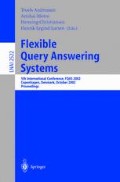Abstract
The paper advocates the interest of distinguishing between negative and positive preferences in the processing of flexible queries. Negative preferences express what is (more or less, or completely) impossible or undesirable, and by complementation state flexible constraints restricting the possible or acceptable values. Positive preferences are not compulsory, but rather express wishes; they state what attribute values would be really satisfactory. The paper discusses the handling of bipolar queries, i.e. queries involving negative and positive preferences, in the framework of possibility theory. Both ordinary queries expressed in terms of requirements, and case-based queries referring to examples, are considered in this perspective.
Access this chapter
Tax calculation will be finalised at checkout
Purchases are for personal use only
Preview
Unable to display preview. Download preview PDF.
References
K. T. Atanassov (1986) Intuitionistic fuzzy sets. Fuzzy Sets and Systems, 20, 87–96, 1986.
S. Benferhat, D. Dubois, S. Kaci, H. Prade (2002) Bipolar representation and fusion of preferences in the possibilistic logic framework. Proc. of the 8th International Conference on Principles of Knowledge Representation and Reasoning, April 22-25, Toulouse, France. Morgan Kaufmann Publi., 421–432.
P. Bosc, J. Kacprzyk (Eds.) (1995) Fuzziness in Database Management Systems. Physica-Verlag, Heidelberg.
P. Bosc, O. Pivert (1992) Some approaches for relational databases flexible querying. J. of Intelligent Information Systems, 1, 323–354.
B. G. Buchanan, E. H. Shortliffe (1984) Rule-Based Expert Systems-The MYCIN Experiments of the Stanford Heuristic Programming Project. Addison-Wesley, Reading, MA.
M. de Calmès, D. Dubois, E. Hüllermeier, H. Prade, F. Sèdes (2002) A fuzzy set approach to flexible case-based querying: methodology and experimentation. Proc. of the 8th International Conference, Principles of Knowledge Representation and Reasoning (KR2002), Toulouse, France, April 22-25, 2002, Morgan Kaufmann Publishers, San Francisco, Ca, 449–458.
H. Christiansen, H.L. Larsen, T. Andreasen (Eds.) (1997) Flexible Query Answering Systems, Kluwer Academic Publishers.
D. Dubois, H. Fargier, H. Prade (1996) Refinements of the maximin approach to decisionmaking in fuzzy environment. Fuzzy Sets and Systems, 81, 103–122.
D. Dubois, H. Prade Twofold fuzzy sets and rough sets-Some issues in knowledge representation. Fuzzy Sets and Systems, 23, 3–18, 1987.
D. Dubois, H. Prade, C. Testemale (1988) Weighted fuzzy pattern matching, Fuzzy Sets and Systems, 28, 313–331.
P. Fortemps, R. Slowinski (2002) A graded quadrivalent logic for ordinal preference modeling: Loyola-like approach. Fuzzy Optimization and Decision Making, 1, 93–111.
M. Grabisch, C. Labreuche (2000) The Sipos integral for the aggregation of interacting bipolar criteria. Proc. 8th Inter. Conf. on Information Processing and Management of Uncertainty in Knowledge-based Systems (IPMU’00), Madrid, 395–409.
H. Larsen, J. Kacpryk, S. Zadrozny, T. Andreasen, H. Christiansen (Eds.) (2001) Flexible Query Answering Systems, Recent Advances, Physica Verlag.
F.E. Petry (1996) Fuzzy Databases: Principles and Applications. Kluwer Acad. Pub.
Author information
Authors and Affiliations
Editor information
Editors and Affiliations
Rights and permissions
Copyright information
© 2002 Springer-Verlag Berlin Heidelberg
About this paper
Cite this paper
Dubois, D., Prade, H. (2002). Bipolarity in Flexible Querying. In: Carbonell, J.G., Siekmann, J., Andreasen, T., Christiansen, H., Motro, A., Legind Larsen, H. (eds) Flexible Query Answering Systems. FQAS 2002. Lecture Notes in Computer Science(), vol 2522. Springer, Berlin, Heidelberg. https://doi.org/10.1007/3-540-36109-X_14
Download citation
DOI: https://doi.org/10.1007/3-540-36109-X_14
Published:
Publisher Name: Springer, Berlin, Heidelberg
Print ISBN: 978-3-540-00074-7
Online ISBN: 978-3-540-36109-1
eBook Packages: Springer Book Archive

